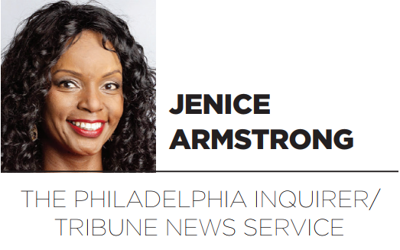
Both the beginning and ending of “Black Panther: Wakanda Forever” were so masterfully done that as I watched on-screen flashbacks of Chadwick Boseman portraying the fictional King T’Challa, tears started flowing down my cheeks.
I cried for the loss of Boseman, a talented actor who was way too young when he died in 2020 of colon cancer, and for the loss of King T’Challa. They weren’t just an actor and a character to me — they represented Black excellence. Howard University, my beloved alma mater, last year named its school of fine arts after Boseman, a 2000 graduate.
I know it sounds corny, but as I sat in that dark theater this week, I made the Wakanda salute with my fists crossed against my chest.
To African Americans like me, “Black Panther: Wakanda Forever” is much more than a Marvel Studios fantasy action flick.
More than a movie
Many of us are descendants of enslaved Africans who arrived in the Americas centuries ago, having been dragged from their homelands and forbidden to speak their native tongues or practice their religions.
Our families were ripped apart and shipped off to plantations in distant parts of the United States, often leaving us — their descendants — with no knowledge of our ancestors’ African heritage and traditions.
Although we may have grown up hearing of the greatness and riches of Africa, many had no real connection to the continent. When I was a kid, the only thing we saw in pop culture that had anything to do with Africa were Tarzan” reruns on TV.
We’ve come a long way since then, but there’s still a deep hunger for connection between African Americans and the Motherland and its people.
Which is why so many theatergoers showed up for “Wakanda Forever” dressed in their finest Afrocentric attire or painted their faces.
Positive media representation of Black and brown people is extremely important, even if it’s only in a fantasy flick. Being able to watch characters on-screen who look like you and are doing remarkable things, demonstrating technological brilliance like in Wakanda, is inspiring.
Young people, particularly those who are disadvantaged, need this kind of imagery to counterbalance the ugly news headlines and negativity that surrounds them and their neighborhoods.
As Derek Lee of D&J Entertainment in the Northeast told me over the phone, “Wakanda Forever” “makes you feel proud.”
Proud enough to bring you to tears.
Jenice Armstrong is a columnist for The Philadelphia Inquirer.



(0) comments
Welcome to the discussion.
Log In
Keep it Clean. Please avoid obscene, vulgar, lewd, racist or sexually-oriented language.
PLEASE TURN OFF YOUR CAPS LOCK.
Don't Threaten. Threats of harming another person will not be tolerated.
Be Truthful. Don't knowingly lie about anyone or anything.
Be Nice. No racism, sexism or any sort of -ism that is degrading to another person.
Be Proactive. Use the 'Report' link on each comment to let us know of abusive posts.
Share with Us. We'd love to hear eyewitness accounts, the history behind an article.